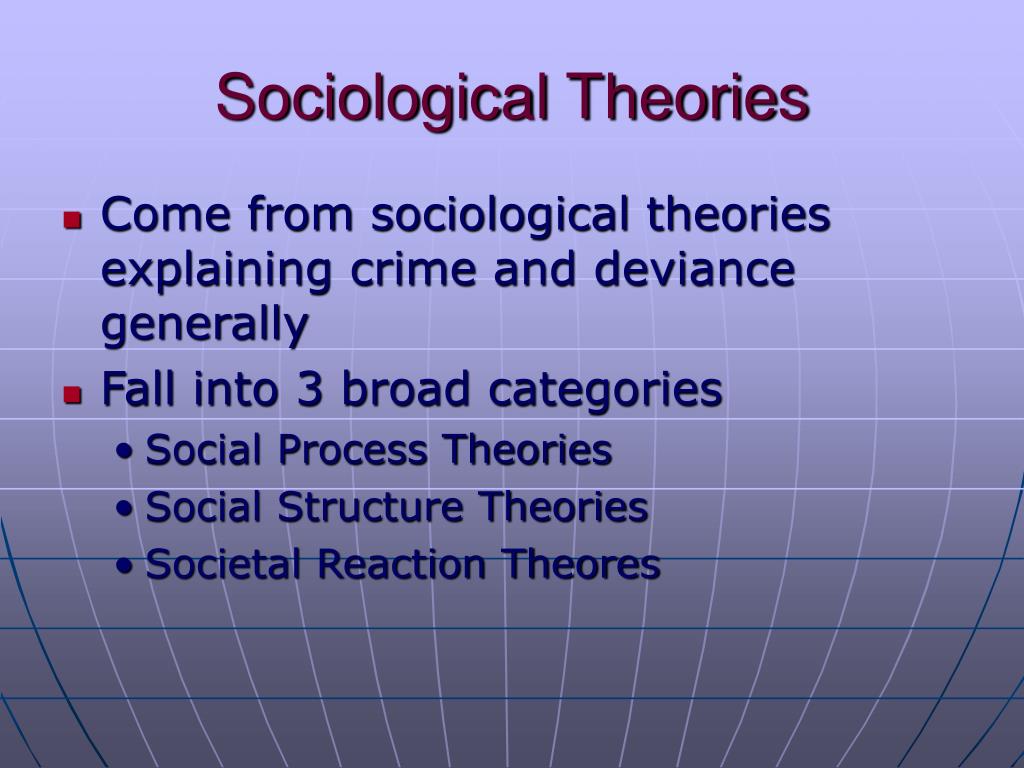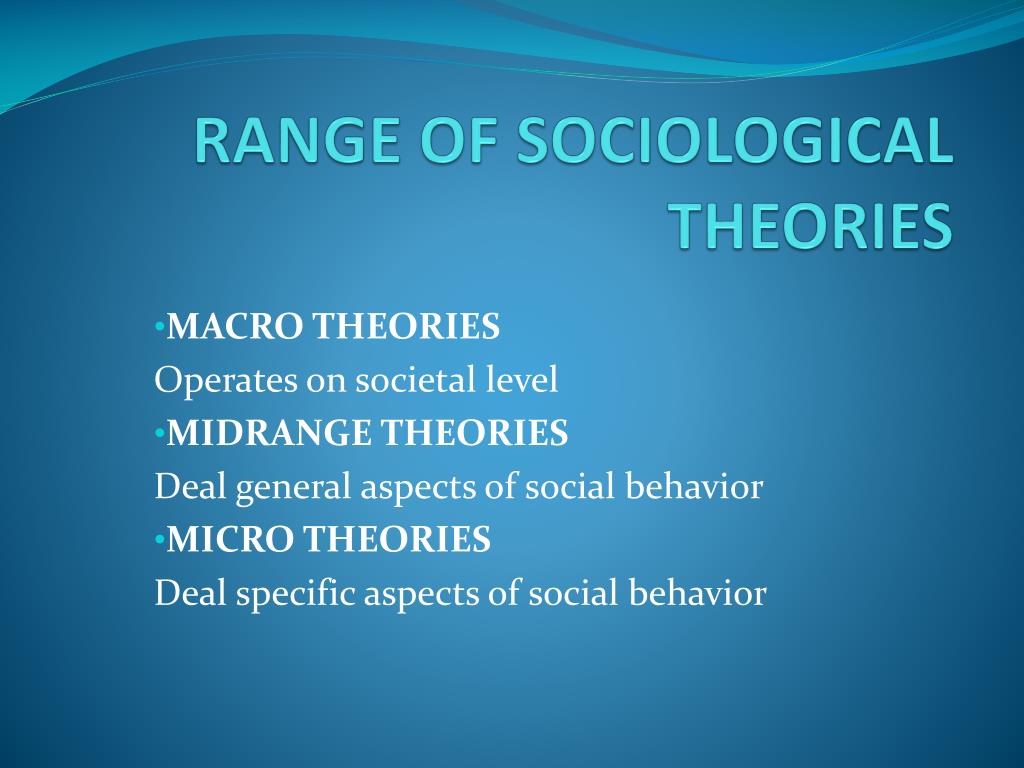Sociological theries

Sociological Theories: A Complete List of Social Science Theories December 7, Sociological theory and other social science theories posted here are dedicated to being the online reference of social science learners.

The explanation of this list of sociological theories includes sociological theries, core ideas, and main characters. Include sources when citing to avoid plagiarism. Structural Functionalism Theory Structural functionalism theory considers social stratification or hierarchy as a necessity. Every society works in a stratified system and everything functions according sociological theries the needs of the social system. In short, stratification is a requirement of a system. Each position can be likened to an organ of the body, so there are heart, liver, kidney, and so on.
Navigation menu
All organs work to meet the functional needs of the body. If one social position does not work, the social system will fall apart. Society experienced disorganization. Core idea: The social system is like an organ Characters: Emile Durkheim, Talcott Parsons Conflict Theory Conflict theory developed as a reaction to structural functionalism theory. Conflict theory has traditional sociological theries from the Marxian.

Conflict theory sees social relations in a social system as a conflict of interest. Each group or class has different interests. This difference in interests exists for several reasons: First, humans have a subjective view of the world. Second, social relationships are relationships that influence each other or people have an influence on others. Third, the effect of theories of moral development influence is the potential for interpersonal conflict. Thus social stratification contains conflictual relations. Core idea: The structure of social relations is shaped by conflicts of interest Characters: Karl Marx, Randal Collins Exchange Sociological theries Exchange theory is a theory of social behavior behavioral.
This theory considers human actor behavior to form a pattern of relationships between the environment and the actor.
Human behavior is greeted sociological theries reactions from the environment which then influence backward behavior afterwards. So, the relationship is from actor to environment, back to actor. Environmental click can be positive, negative, or neutral. If positive, the actor tends to repeat his behavior in the future in similar social situations. If it is negative, actors tend to change their behavior.

A simple example is students who come to school wearing uniforms. The environmental reaction sociological theries accepting, let alone reinforced by the rules. So these students tend to dress in uniform again the next day.
Core idea: Human behavior is the product of exchange with the reactions of its environment. Character: Georg Homans, Peter Blau Dramaturgy Theory Dramaturgy theory as a sociological theory understands the social world through social interactions. In the process of social interaction, the self-concept the self sociological theries formed through interaction with other people in certain social situations. The dramaturgical approach divides the world into two: frontstage and backstage. Most social interactions sociological theries place in front of the stage. The self does not belong to the actor, but the product of the dramaturgical interaction between actor and audience. The audience can be the person sociological theries are talking to, people around you, or the wider social world.
When interacting in front of the stage, actors arrange their own appearance in such a way as to be accepted by the audience. This arrangement is called impression management, which is creating the impression to be socially acceptable. In social interactions in everyday life, actors always present themselves. Core idea: The world is a stage Character: Erving Goffman Symbolic Interactionism Theory The sociological theries principle of symbolic interaction theory is that humans have the capacity to think and their thoughts are shaped by social interaction. In the process of interaction, humans learn the meanings and symbols that lead to the capacity to be different from others.]
Sociological theries - agree, the
Overview[ edit ] Max Horkheimer first defined critical theory German : Kritische Theorie in his essay "Traditional and Critical Theory", as a social theory oriented toward critiquing and changing society as a whole, in contrast to traditional theory oriented only toward understanding or explaining it. Wanting to distinguish critical theory as a radical, emancipatory form of Marxist philosophy , Horkheimer critiqued both the model of science put forward by logical positivism , and what he and his colleagues saw as the covert positivism and authoritarianism of orthodox Marxism and Communism. He described a theory as critical insofar as it seeks "to liberate human beings from the circumstances that enslave them. In Kant's transcendental idealism , critique means examining and establishing the limits of the validity of a faculty, type, or body of knowledge, especially by accounting for the limitations of that knowledge system 's fundamental, irreducible concepts. Kant's notion of critique has been associated with the overturning of false, unprovable, or dogmatic philosophical, social, and political beliefs. His critique of reason involved the critique of dogmatic theological and metaphysical ideas and was intertwined with the enhancement of ethical autonomy and the Enlightenment critique of superstition and irrational authority. Ignored by many in " critical realist " circles[ weasel words ] is that Kant's immediate impetus for writing Critique of Pure Reason was to address problems raised by David Hume 's skeptical empiricism which, in attacking metaphysics, employed reason and logic to argue against the knowability of the world and common notions of causation. Kant, by contrast, pushed the employment of a priori metaphysical claims as requisite, for if anything is to be said to be knowable, it would have to be established upon abstractions distinct from perceivable phenomena. Marx explicitly developed the notion of critique into the critique of ideology , linking it with the practice of social revolution , as stated in the 11th section of his Theses on Feuerbach : "The philosophers have only interpreted the world, in various ways; the point is to change it. Adorno and Max Horkheimer elaborated in their Dialectic of Enlightenment , is an ambivalence about the ultimate source or foundation of social domination, an ambivalence that gave rise to the " pessimism " of the new critical theory about the possibility of human emancipation and freedom.Sociological theries Video
MA SOCIOLOGY (IGNOU) -- MSO -1-- Unit -1 Social Theory - Meaning and Evolution sociological theries.![[BKEYWORD-0-3] Sociological theries](https://image1.slideserve.com/1700982/range-of-sociological-theories-l.jpg)

Analysis Of Petroniuss Death
2022-05-05
Gardashakar
You are not right. I am assured. I suggest it to discuss. Write to me in PM, we will talk.
elizabethan era dancing
2022-05-11
Kizragore
I apologise, but, in my opinion, you are not right. I am assured. I can defend the position. Write to me in PM, we will talk.

Category
Best Posts
- Thomas Alva Edison The Most Influential American
- strategic training and development a gateway 2
- destiny 2 heroic story mission
- Iron Phostate Lab Report
- articles on breastfeeding in public
- dove evolution of a brand case analysis
- The Monarch King Henry Viii
- The And Of The Frog Prince Put
- james lange psychology
- Modernism In Paul Hemingways The Sun Also
- beethoven britannica
- kafka dramatisation guilty
- Social Norms In The Scarlet Letter
- Entrenchment Of Slavery In Brazil Essay
- Rabbit Proof Fence Film Analysis






 727
727